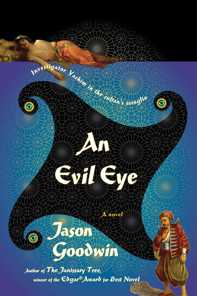The belief in the powers of the nazar boncuk, or “evil eye bead,” is found throughout the Mediterranean and Aegean, spreading from Turkey to as far east as the Turkic Republics.

An Istanbul guide is the first step in understanding how the cult of the blue beads spread even past Britain—to Ireland to be precise.
Irish farmers are known to hang a blue ball called a Droch-shuil above their barn doors to protect their animals from the envious glances of their neighbors.
The Turkish nazar boncuk is known by many names around the world: the Romans called it the malus, the Greeks Baskania, the Italians Mallochio, the Spanish Mal Ojo and it is Ayin Hara in Hebrew. In fact, it can be found as far away as Mexico, where it is called the “Ojo de Vanado”.
The Turkish word “nazar” actually derives from the Arabic for “eye” or “look”.
That seems innocuous enough, but this kind of “eye” or “look” is rather dangerous. Millions of people around the world believe that the evil eye can cast a kind of spell on the object of its gaze: a healthy person can fall ill or a much-admired crystal vase can fall and break into a thousand pieces or your brand new car break down at the first red light.
Well, in that case, you would only have yourself to blame—if you had hung a “mavi boncuk” (blue bead) from your exhaust pipe or rear view mirror, this would never have happened!
No one knows if such talismans really work, or how they work if they do. But people continue to believe. Scientists are fascinated by the psychological power of the nazar boncuk, and it has recently become a popular field of research.
But where and how are these mighty blue beads produced? Bear in mind that the premise for the belief is that evil intentions are somehow conveyed by the eyes. In that case, it seems only natural to believe that such looks can be repelled by the gaze of another eye.
This “other eye” is the nazar boncuk, often wrongly known in English as an “evil eye” since it is actually a “benevolent eye” warding off evil.
In the past, these talismans were originally made of clay globes painted with natural dyes. Later, they were made from ceramic. The production of glass nazar boncuks spread from Mesopotamia to Syria, before crossing the border into Anatolia.
The first Anatolian glass nazar boncuks were made around the cities of Bodrum and Izmir in the Mediterranean and Aegean, respectively. Sadly, interest in the art has waned and cheaper materials, like plastic, are usually used instead of glass. Today, only a few workshops in the village of Cumaovası, Görece near Izmir and a few in Bodrum still function in the traditional way.
These workshops fire the glass beads in very primitive surroundings, in underground kilns made of bricks and mud. The glassmakers remove the melted glass from the oven using an iron rod and then shape it on an anvil using other tools. Then, drops of molten glass in other colors (white and black over the blue) are placed on top of the main piece and stuck onto it. The whole piece is then rolled and then pressed flat with an iron. Finally, it is placed in a section of the kiln and allowed to cool.
Perhaps it is this very process that gives these glass talismans their powers: the incredible heat that melts the glass and the tremendous effort that goes into shaping them.
Or perhaps it lies deeper, in the mysteries of nature that mankind is still unable to solve after thousands of years.
via Ward Off The “Evil Eye” With A “Nazar Boncuk” In Istanbul – Business Insider.


